Module 4 Healthy food Unit3 Language in use.课件(共34张PPT)
文档属性
| 名称 | Module 4 Healthy food Unit3 Language in use.课件(共34张PPT) | 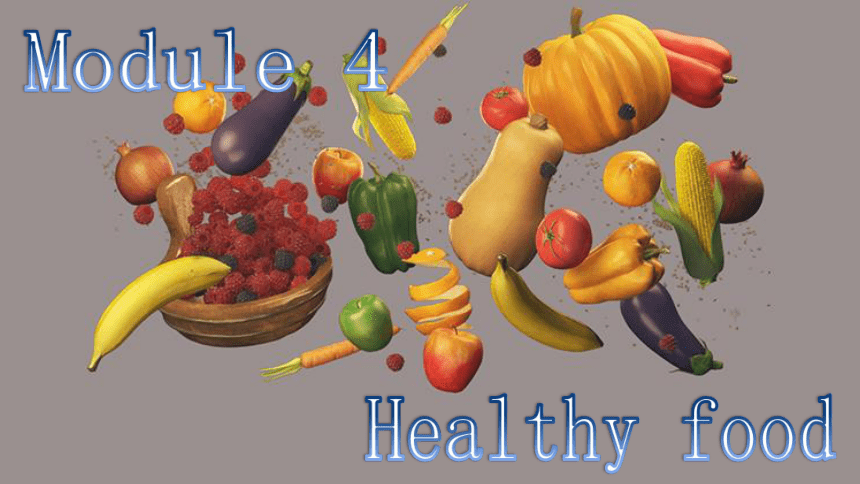 | |
| 格式 | pptx | ||
| 文件大小 | 3.2MB | ||
| 资源类型 | 教案 | ||
| 版本资源 | 外研版 | ||
| 科目 | 英语 | ||
| 更新时间 | 2023-08-10 19:13:17 | ||
图片预览

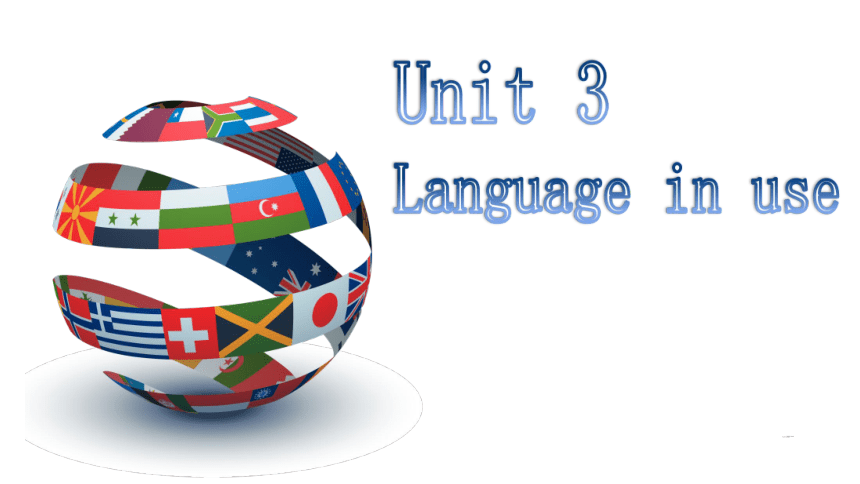
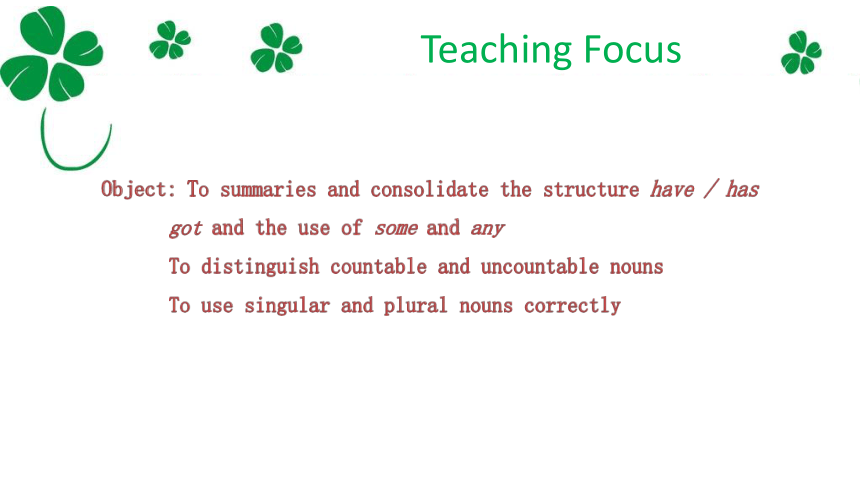
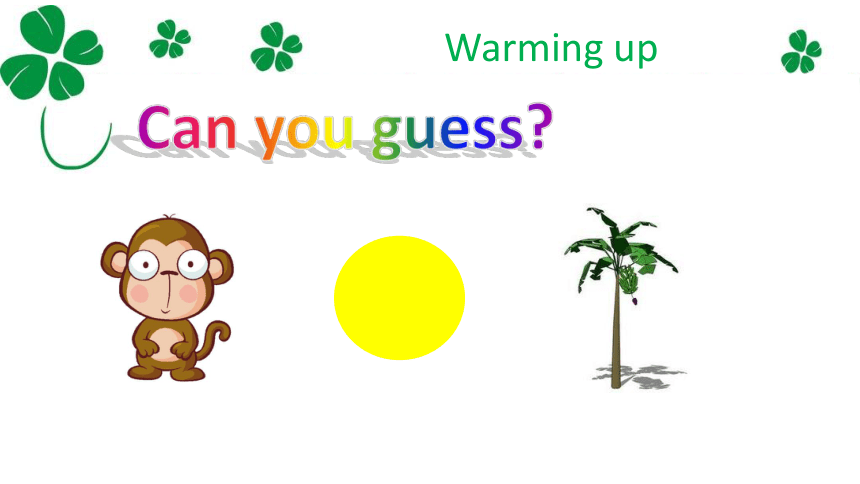
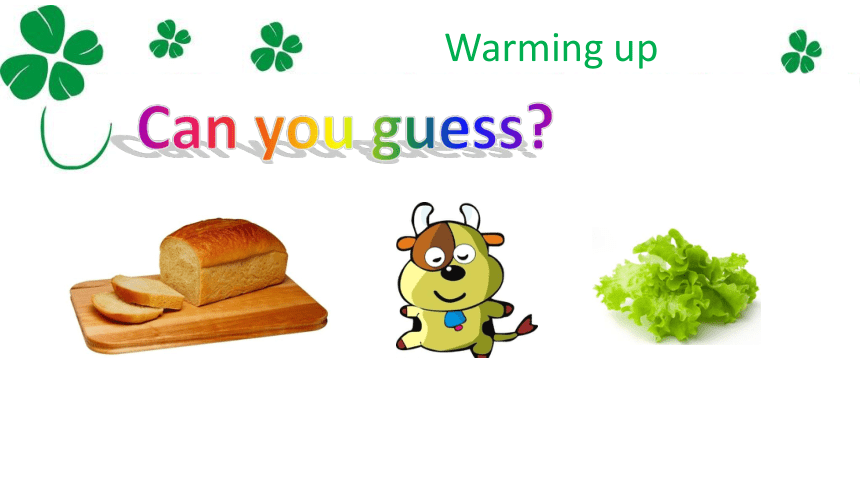

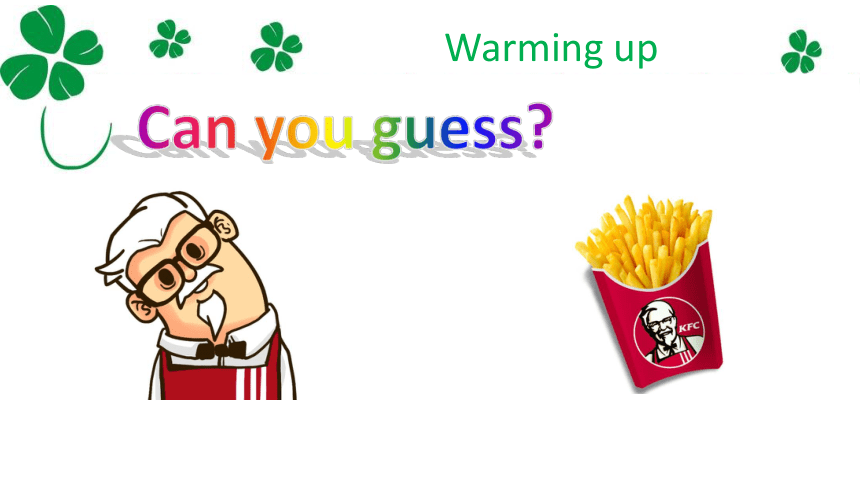
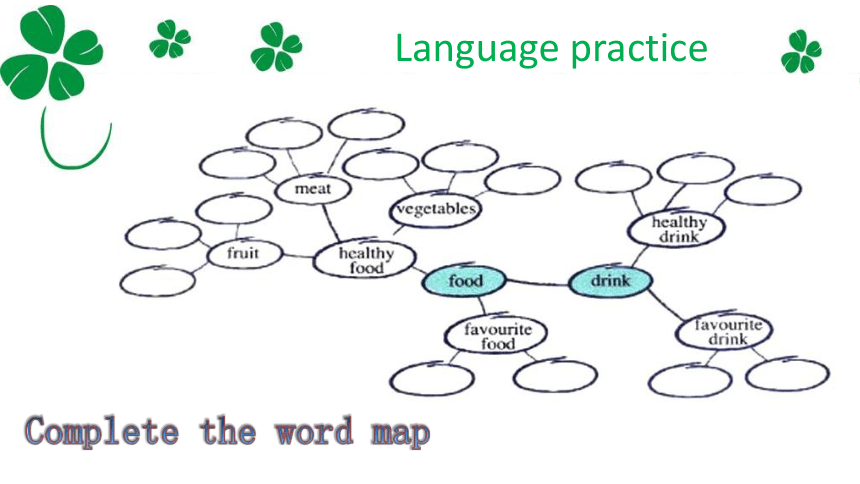
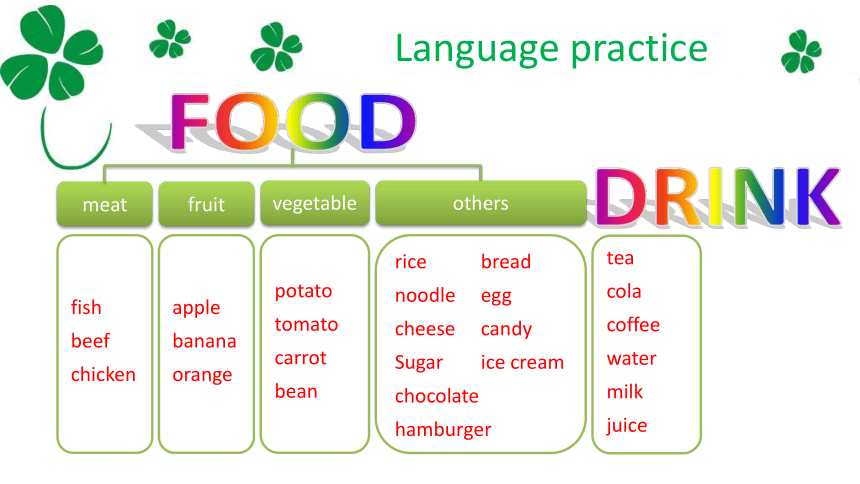
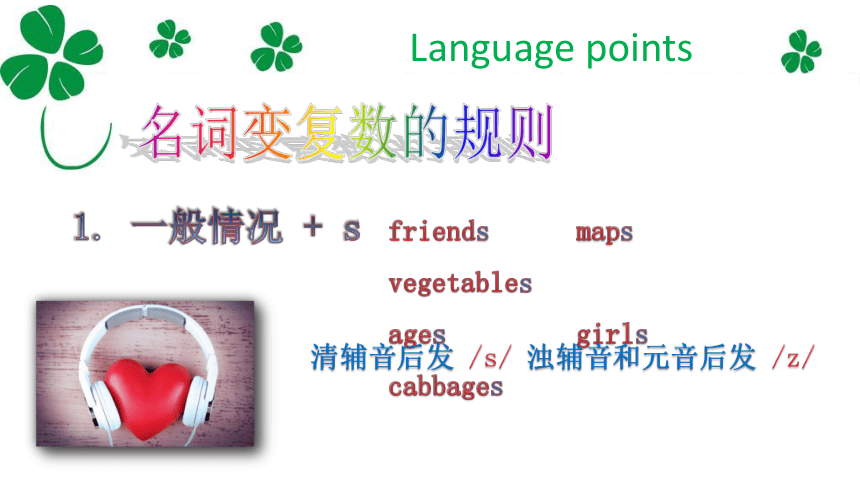
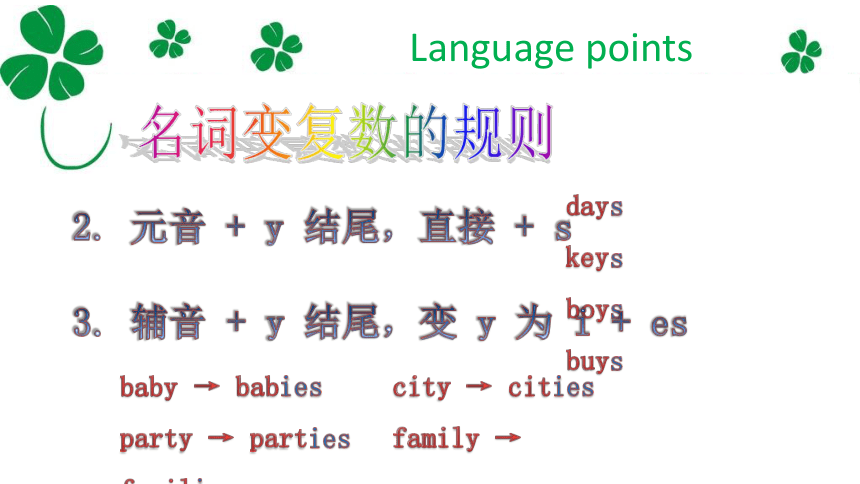
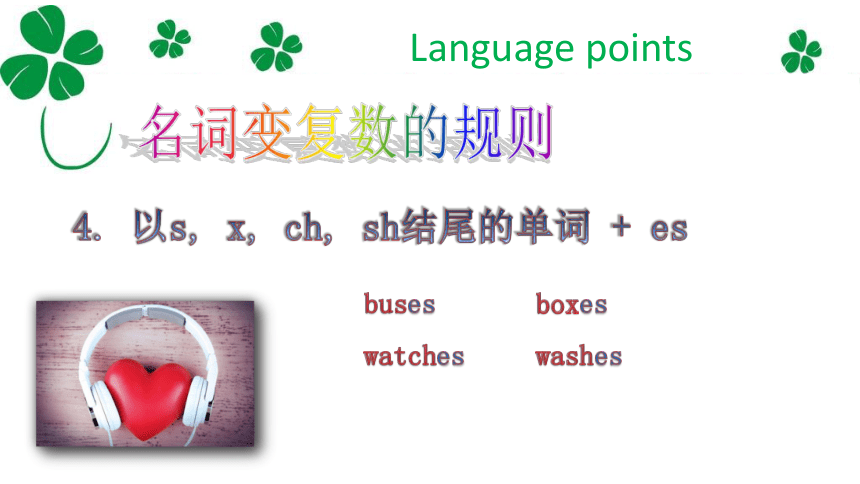
文档简介
(共34张PPT)
Module 4
Healthy food
Rachel_jiangqi
Unit 3
Language in use
Rachel_jiangqi
Teaching Focus
Object: To summaries and consolidate the structure have / has got and the use of some and any
To distinguish countable and uncountable nouns
To use singular and plural nouns correctly
Warming up
Can you guess
Warming up
Can you guess
Warming up
Can you guess
Warming up
Can you guess
Language practice
Complete the word map
Language practice
rice bread
noodle egg
cheese candy
Sugar ice cream
chocolate
hamburger
fish
beef
chicken
apple
banana
orange
potato
tomato
carrot
bean
meat
fruit
vegetable
tea
cola
coffee
water
milk
juice
FOOD
DRINK
others
Language points
名词变复数的规则
1. 一般情况 + s
friends maps vegetables
ages girls cabbages
清辅音后发 /s/ 浊辅音和元音后发 /z/
Language points
名词变复数的规则
2. 元音 + y 结尾,直接 + s
days keys boys buys
3. 辅音 + y 结尾,变 y 为 i + es
baby → babies city → cities
party → parties family → families
Language points
名词变复数的规则
4. 以s, x, ch, sh结尾的单词 + es
buses boxes
watches washes
Language points
名词变复数的规则
5. 以 f 或 fe 结尾,变 f 或 fe 为 ves
life → lives leaf → leaves
wife → wives knife → knives
Language points
名词变复数的规则
6. 以 o 结尾的名词(背熟以下加 es 的)
potatoes tomatoes
heroes (英雄)
Language points
名词变复数的规则
7. 名词复数的不规则变化
child → children tooth → teeth
foot → feet mouse → mice
man → men woman → women
Language points
名词变复数的规则
8. 单复数同形
fish sheep deer
Chinese Japanese
9. 集体名词(本身为复数)
people police
不能说 a people, a police,但可以说 a person, a policeman
Language points
1. 物质名词(无法分为个体的实物的词)
不可数名词
snow rain
water coffee tea milk juice Coke cola soup
rice bread cheese candy sugar ice cream chocolate
food fruit meat beef fish pork chicken
Language points
2. 抽象名词(示动作、状态、品质、感情等抽象概念的词)
不可数名词
work study love friendship
Language points
随堂测试
Around the world
A Western breakfast
In the West, for breakfast, people usually eat bread and eggs and drink coffee or tea, milk and fruit juice.
How about Chinese breakfast
Language practice
bit
delicious
important
remember
stay
重要的
保持
记住
一点儿
美味的
Language practice
bit
delicious
important
remember
stay
一点儿
美味的
重要的
记住
保持
a bit + adj.
it is important to do sth
remember to do sth
Language practice
bit delicious important remember stay
1. to buy some fruit.
2. It’s to eat healthy food.
3. Eat well and healthy.
4. Orange juice is . Let’s buy some.
5. I am a tired.
Complete the sentences
Language points
肯定句 主语 + have / has got + …
have / has got 表示 “有”
We have got lots of apples.
She has got some books.
1) I, you, we, they & 复数名词 + have
2) she, he, it & 单数名词 + has
Language points
否定句 主语 + haven’t / hasn’t got + …
have / has got 表示 “有”
We haven’t got any meat.
She hasn’t got any coffee.
Language points
一般疑问句 have / has + 主语 + got + …
have / has got 表示 “有”
Have we got any chocolate
Has she got any milk
Yes, we have. / Yes, she has.
No, we haven’t. / No, she hasn’t.
Language points
1. some + 肯定句 / any + 否定句、疑问句
Some 和 any
Let’s get some chicken.
We haven’t got any oranges.
Language points
2. 在表示建议、反问、请求的疑问句中或期
望得到肯定回答时,多用some而不用any
Some 和 any
Do you want some bananas
Language points
随堂测试
Language practice
Language practice
Have we got any … in the fridge
Yes, we have. / No, we haven’t.
Language practice
Language practice
We’ve got some meat. We haven’t got any fish.
1. vegetables.
2. orange.
3. apples.
4. eggs.
5. bananas.
6. orange juice.
7. milk.
Language practice
apple hamburger orange potato tomato
apples hamburgers oranges potatoes tomatoes
fish meat rice milk
juice chicken water
He has got some a(n)…
He hasn’t got any…
She has got some a(n)…
She hasn’t got any…
The have got some a(n)…
They haven’t got any…
Module task
Making a poster about a healthy breakfast.
Present your poster to the class.
Choose the best poster.
Module 4
Healthy food
Rachel_jiangqi
Unit 3
Language in use
Rachel_jiangqi
Teaching Focus
Object: To summaries and consolidate the structure have / has got and the use of some and any
To distinguish countable and uncountable nouns
To use singular and plural nouns correctly
Warming up
Can you guess
Warming up
Can you guess
Warming up
Can you guess
Warming up
Can you guess
Language practice
Complete the word map
Language practice
rice bread
noodle egg
cheese candy
Sugar ice cream
chocolate
hamburger
fish
beef
chicken
apple
banana
orange
potato
tomato
carrot
bean
meat
fruit
vegetable
tea
cola
coffee
water
milk
juice
FOOD
DRINK
others
Language points
名词变复数的规则
1. 一般情况 + s
friends maps vegetables
ages girls cabbages
清辅音后发 /s/ 浊辅音和元音后发 /z/
Language points
名词变复数的规则
2. 元音 + y 结尾,直接 + s
days keys boys buys
3. 辅音 + y 结尾,变 y 为 i + es
baby → babies city → cities
party → parties family → families
Language points
名词变复数的规则
4. 以s, x, ch, sh结尾的单词 + es
buses boxes
watches washes
Language points
名词变复数的规则
5. 以 f 或 fe 结尾,变 f 或 fe 为 ves
life → lives leaf → leaves
wife → wives knife → knives
Language points
名词变复数的规则
6. 以 o 结尾的名词(背熟以下加 es 的)
potatoes tomatoes
heroes (英雄)
Language points
名词变复数的规则
7. 名词复数的不规则变化
child → children tooth → teeth
foot → feet mouse → mice
man → men woman → women
Language points
名词变复数的规则
8. 单复数同形
fish sheep deer
Chinese Japanese
9. 集体名词(本身为复数)
people police
不能说 a people, a police,但可以说 a person, a policeman
Language points
1. 物质名词(无法分为个体的实物的词)
不可数名词
snow rain
water coffee tea milk juice Coke cola soup
rice bread cheese candy sugar ice cream chocolate
food fruit meat beef fish pork chicken
Language points
2. 抽象名词(示动作、状态、品质、感情等抽象概念的词)
不可数名词
work study love friendship
Language points
随堂测试
Around the world
A Western breakfast
In the West, for breakfast, people usually eat bread and eggs and drink coffee or tea, milk and fruit juice.
How about Chinese breakfast
Language practice
bit
delicious
important
remember
stay
重要的
保持
记住
一点儿
美味的
Language practice
bit
delicious
important
remember
stay
一点儿
美味的
重要的
记住
保持
a bit + adj.
it is important to do sth
remember to do sth
Language practice
bit delicious important remember stay
1. to buy some fruit.
2. It’s to eat healthy food.
3. Eat well and healthy.
4. Orange juice is . Let’s buy some.
5. I am a tired.
Complete the sentences
Language points
肯定句 主语 + have / has got + …
have / has got 表示 “有”
We have got lots of apples.
She has got some books.
1) I, you, we, they & 复数名词 + have
2) she, he, it & 单数名词 + has
Language points
否定句 主语 + haven’t / hasn’t got + …
have / has got 表示 “有”
We haven’t got any meat.
She hasn’t got any coffee.
Language points
一般疑问句 have / has + 主语 + got + …
have / has got 表示 “有”
Have we got any chocolate
Has she got any milk
Yes, we have. / Yes, she has.
No, we haven’t. / No, she hasn’t.
Language points
1. some + 肯定句 / any + 否定句、疑问句
Some 和 any
Let’s get some chicken.
We haven’t got any oranges.
Language points
2. 在表示建议、反问、请求的疑问句中或期
望得到肯定回答时,多用some而不用any
Some 和 any
Do you want some bananas
Language points
随堂测试
Language practice
Language practice
Have we got any … in the fridge
Yes, we have. / No, we haven’t.
Language practice
Language practice
We’ve got some meat. We haven’t got any fish.
1. vegetables.
2. orange.
3. apples.
4. eggs.
5. bananas.
6. orange juice.
7. milk.
Language practice
apple hamburger orange potato tomato
apples hamburgers oranges potatoes tomatoes
fish meat rice milk
juice chicken water
He has got some a(n)…
He hasn’t got any…
She has got some a(n)…
She hasn’t got any…
The have got some a(n)…
They haven’t got any…
Module task
Making a poster about a healthy breakfast.
Present your poster to the class.
Choose the best poster.
同课章节目录
- Starte
- Module 1 My teacher and my friends
- Module 2 My English lesson
- Module 3 My English book
- Module 4 My everyday life
- Module 1 My classmates
- Unit 1 Nice to meet you.
- Unit 2 I'm Wang Lingling and I'm thirteen years ol
- Unit 3 Language in use.
- Module 2 My family
- Unit 1 Is this your mum?
- Unit 2 These are my parents.
- Unit 3 Language in use.
- Module 3 My school
- Unit 1 There are thirty students in my class.
- Unit 2 The library is on the left of the playgroun
- Unit 3 Language in use.
- Module 4 Healthy food
- Unit 1 We've got lots of apples.
- Unit 2 Is your food and drink healthy?
- Unit 3 Language in use.
- Module 5 My school day
- Unit 1 I love history.
- Unit 2 We start work at nine o'clock.
- Unit 3 Language in use.
- Revision module A
- Module 6 A trip to the zoo
- Unit 1 Does it eat meat?
- Unit 2 The tiger lives in Asia.
- Unit 3 Language in use.
- Module 7 Computers
- Unit 1 How do I write my homework on the computer?
- Unit 2 When do you use a computer?
- Unit 3 Language in use.
- Module 8 Choosing presents
- Unit 1 I always like birthday parties.
- Unit 2 She often goes to concerts.
- Unit 3 Language in use.
- Module 9 People and places
- Unit 1 We're enjoying the school trip a lot.
- Unit 2 They're waiting for buses or trains.
- Unit 3 Language in use.
- Module 10 Spring Festival
- Unit 1 Are you getting ready for Spring Festival?
- Unit 2 My mother's cleaning our houses and sweepin
- Unit 3 Language in use.
- Revision module B
